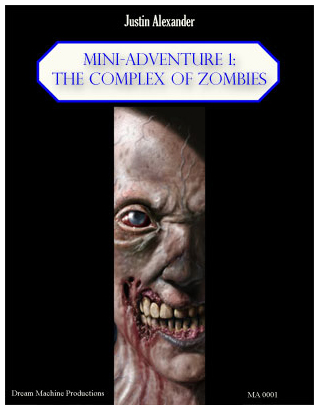IN THE SHADOW OF THE SPIRE
Session 6A: Blood in the Depths
In which a hole in the wall leads to an unexpected labyrinth, and one pest problem quickly leads to another…
This section of the campaign is notable because the dungeon complex they begin to explore at the end of it was directly adapted into the The Complex of Zombies, a mini-module which you can purchase on Drivethru (among other places).
Adapting material from your personal campaign into a published form can be very rewarding, but there are a number of pitfalls you need to avoid.
 The first thing you have to do is purge the material of any material inherited from other creators. Personal campaigns are, I fervently believe, strengthened beyond measure by becoming a beautiful mélange of influences and inputs. Copyright law, on the other hand, has other opinions.
The first thing you have to do is purge the material of any material inherited from other creators. Personal campaigns are, I fervently believe, strengthened beyond measure by becoming a beautiful mélange of influences and inputs. Copyright law, on the other hand, has other opinions.
In the case of The Complex of Zombies, fortunately, I’ve already “translated” Monte Cook’s Ptolus into my own campaign world (which I’ve been running and developing since 2000), which often has the effect of preemptively scrubbing off many of the serial numbers. But some work still needed to be done.
This process is less simple than it may first appear because you can’t just go through and delete everything. That would leave the material feeling hollow and incomplete. Nor, in my opinion, can you just replace other people’s creative content with generic versions of the same: “Generic” isn’t good. Generic lacks identity. Generic lacks interest.
So you have to go in, take this one really cool thing that has a bunch of specific context and content that you can’t use, and you have to replace it with something really cool and creative and detailed in its own right. And that usually has a cascade effect, as one change affects another. A well-designed scenario, after all, isn’t a bunch of unrelated stuff: So once you start changing some elements, the rest of the scenario can and should change, too.
(This process is often beneficial, though: Re-contextualizing material from one context into another often lends richer and unexpected depths to the new context which you might not otherwise have considered or created.)
For The Complex of Zombies, the most notable example of this was swapping out the deep background of Ghul’s Labyrinth (beneath Monte Cook’s Ptolus) for the research complex of the Sons of Jade. If I recall correctly, the Sons of Jade were an original creation for the adventure module, but I tied them into the mythology of the Jade Magi and the Lost City of Shandrala, which I had originally developed for the background of the gemstone golems I’d designed for the Penumbra Bestiary (although that background was stripped out of the final book) and which had also featured in a proposed mega-adventure in the pre-3.5 says of the D20 license. (A project which I occasionally play with the idea of returning to, but probably won’t all things considered.)
And although this didn’t really apply to The Complex of Zombies, the other thing you have to be wary of when going from table-to-page is trying to recapture the campaign instead of the scenario. For example, I’ve actually encountered multiple published scenarios where the author, seemingly out of the blue, suddenly starts talking about what the GM should do if one of the PCs falls in love with a seemingly random NPC.
This is almost certainly because that’s what happened in their campaign. In one case, this ended up being an extended subplot that chewed up almost half of the published scenario. Twenty or thirty pages of material. And I’m willing to bet hard currency that it was an absolutely, positively amazing experience at the table; probably one of those gaming memories that you’re still talking about fondly twenty years later.
But I’ll also guarantee you that literally no one else playing in that scenario will ever duplicate that precise experience. And you have to be cautious of those moments — at both the seemingly obvious macro-level, but also at the more insidious micro-level — when attempting to offer the material to other people. If you do your job well, then the odds are that the other GMs running your scenario will experience similarly amazing, spontaneous, and memorable acts at the gaming table. But they won’t be the same moments that you experienced. (No matter how much you try to craft a railroad to force that moment to come again. It’s like when things go sour in Groundhog Day as Bill Murray’s character tries to recreate the perfect day.)











